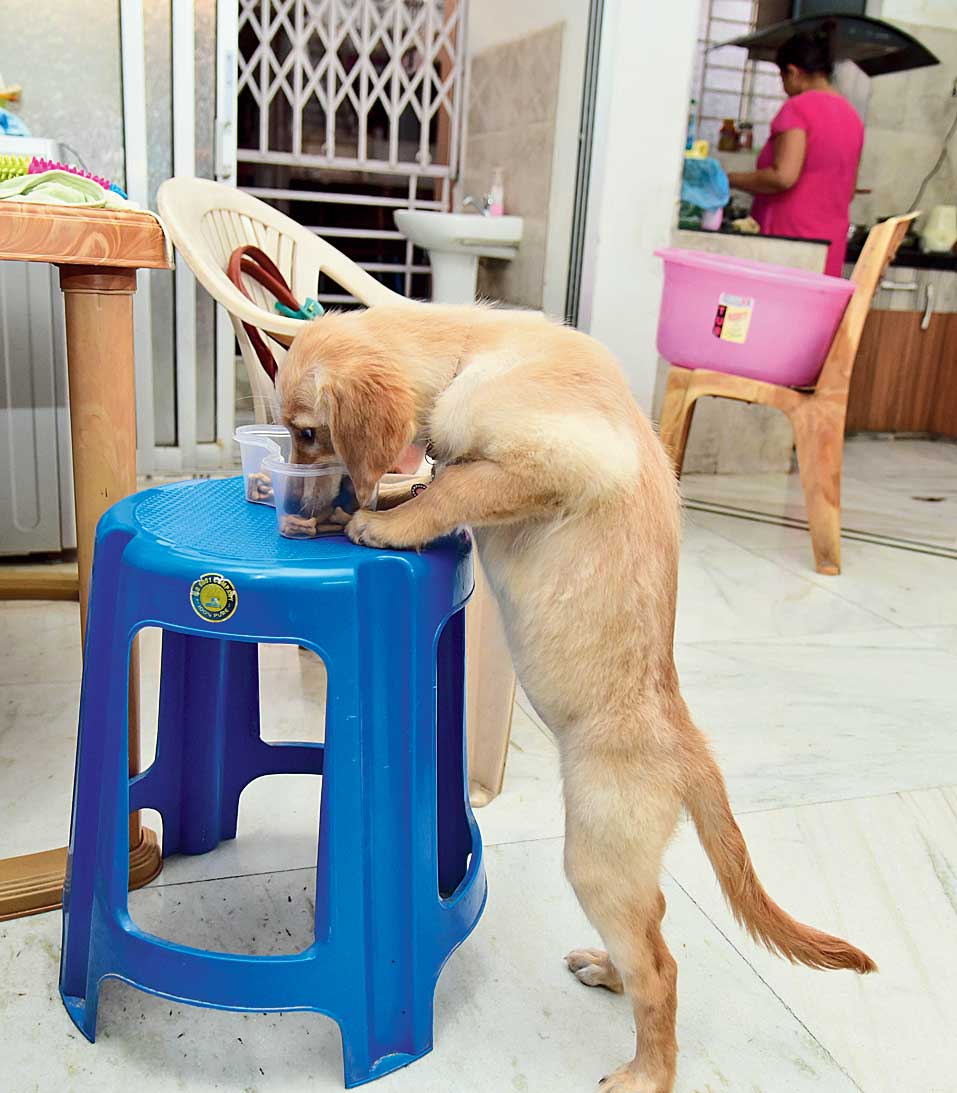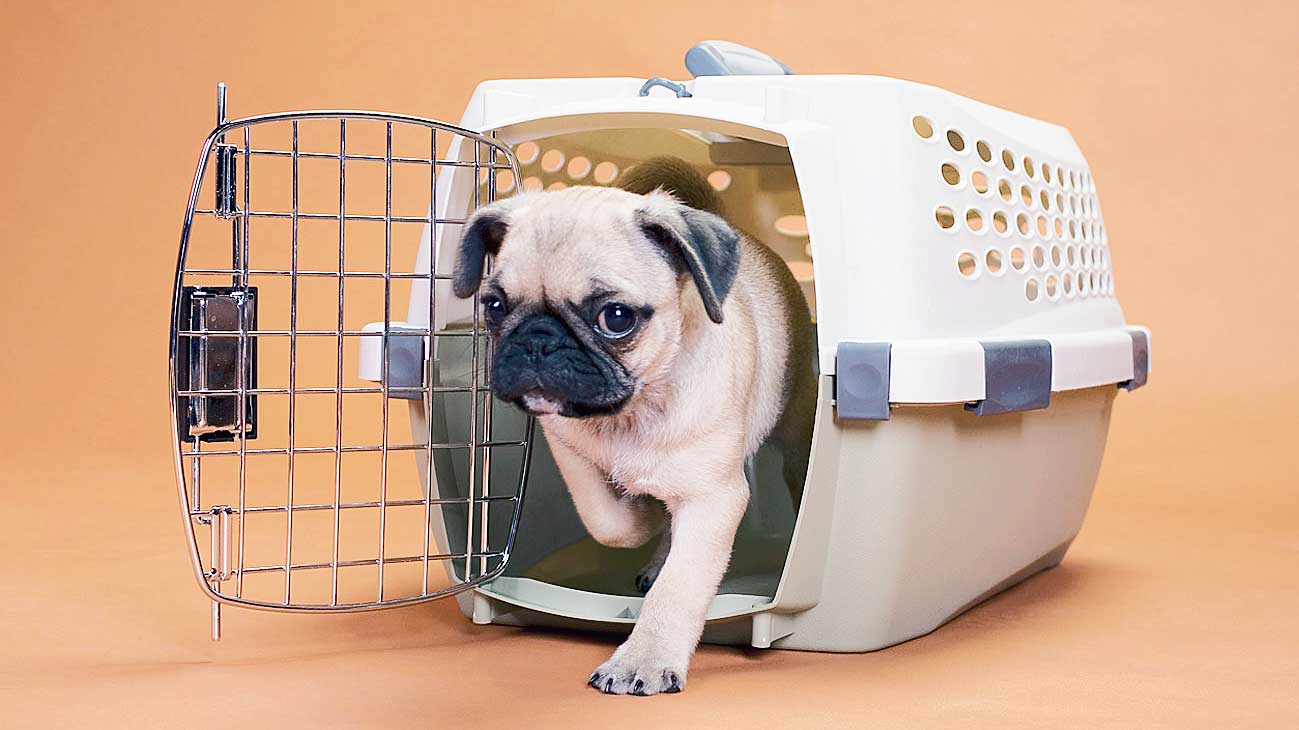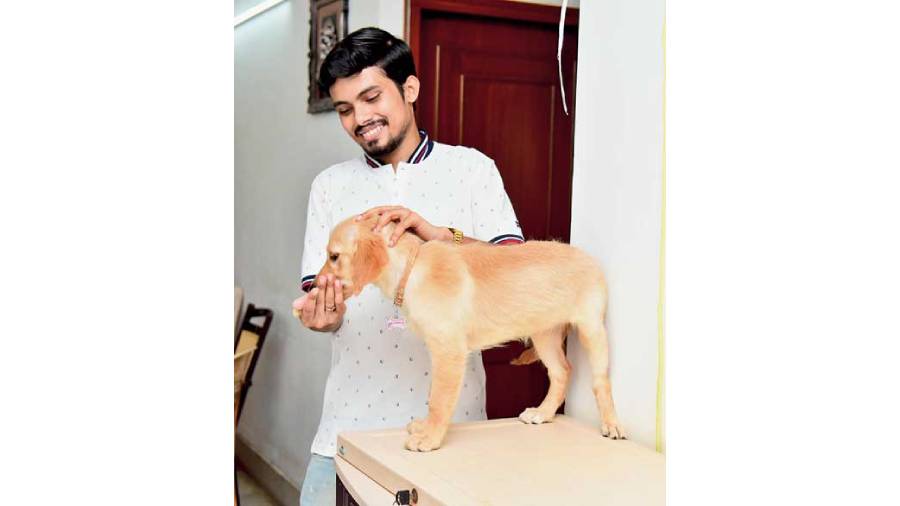Residents have been getting puppies all through the pandemic. Some are doing it to help them overcome their boredom, some to get their mind off the depressing Covid-19 news and some because they feel they would never have a more opportune time to devote all their time to bringing up the dog.
But the initial months can be tiresome! For such pet parents, Saptadeep Pal held a puppy-training workshop for first-time dog owners at Hugs n Wags pet creche in New Town’s AE Block.
“It’s not uncommon for families to abandon their dogs because they failed to toilet train them or because the dog bit and tore things,” said Pal, who has trained under experts like Arnold Kivago and Mike Ritland. “Then dog-owners receive wrong advice from others and cause further damage.” So here’s what Pal had to say-

A puppy climbs a table to reach for biscuits. Stay calm if you want your dog to drop what he has taken without permission. Shubham Paul
He eats everything
Do not: Chase your pup and make a fuss about him having put something into his mouth. He may panic and swallow the object. Or he may believe this to be a way of attracting attention and make a habit of this.
Do: Keep a collar on the pup at all times so it’s easy to grab him by it. Once you get hold of him do not pull the object out, lest he think it to be a game of tug of war. Simply hold the object firmly till he gets bored and releases it.
You may also offer him a treat so he releases the object to eat the treat. Or you could pinch him slightly in the belly. It won’t hurt much but the object will immediately come out of his mouth.
Toilet training
Do: When your puppy wakes up in the morning, lead him to the washroom or wherever it is you want him to relive himself. Now do not let him out till he has done his business. Take him there after all meals too. He will soon get the message.
Separation anxiety
Do not: Make a fuss about leaving the house. Don’t pet him excessively or apologise for having to leave him.
In fact don’t constantly tell your pup to do this and do that or he’ll become dependent on you to make all his decisions. He needs to be able to take his own decisions when he’s home alone.
Do: Leave casually without any fanfare. Even when you return, give it a while before you start playing with him. That way he won’t come to think that being left behind is a big deal. You could boost his confidence by fixing a “me time” for him every day when he stays by himself.
Leash walking
Do: When going for a walk keep him on a long leash and let the puppy run. If he tries to be mischievous pull him back.
Do not: Be afraid of street dogs barking at your puppy. Put yourself between the two and walk on calmly. Your pup looks up to you. If he sees you calm, he’ll remain calm.

A Pug steps out of his crate
Crate training
Crate training is the practice of keeping a dog in his crate or cage for some time. While in India many people think this is imprisonment, the practice is very popular in the West.
The crate is your dog’s own space. It’s a good idea to keep him inside it, particularly after meals. This is because after eating they tend to get very energetic and may vomit what they have eaten.
It’s also a good idea to keep them in the crate during Diwali when loud firecrackers are bursting all around. Simply cover the crate with a cloth and he’ll feel safe.
Those leaving their pets alone may also consider crate training. It protects against any accidents the unsupervised dog may get into.
Table-top lessons
Many dogs don’t let the vet check them so here’s a trick to overcome the problem.
Once a day put your pup on a high table and check his paws, ears and teeth. Lift his tail, check for ticks, lumps, dirt and brush him. The pup will be so distracted by the sudden height that he won’t object to the checking. Eventually he’ll get used to the practice and won’t object to the vet checking him either.
Also practise holding your dog firmly, even if he protests. Don’t leave him till he calms down. This will go a long way in giving him injections smoothly. If he bites you, push his nose down.











